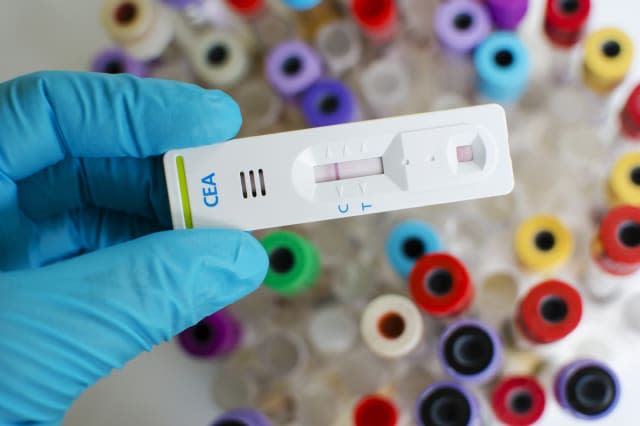NHS bowel cancer test taken up by fewer than half invited

More than half of people invited for a new NHS bowel cancer test did not take it up, despite the fact it could save thousands of lives, a charity has said.
Cancer Research UK published data showing many people did not want the test, with just one third of those in poorer areas attending their appointment.
The NHS Bowel Scope Screening Programme, which is being rolled out across the UK, offers a one-off test to people aged 55.
A thin, flexible tube with a tiny camera on the end is used to look inside the large bowel.
Pre-cancerous growths - known as polyps - can be detected and removed before they become cancerous.
A pilot study ran in six areas of England, including Norwich, Kent, Wolverhampton and Guildford in Surrey.
The test is now being offered at more than 70% of bowel cancer screening centres across England.
Data from the pilot, published in the Journal of Medical Screening, showed just a third of people in the most deprived neighbourhood went for their appointment compared with over half in the most affluent.
More men (45%) took the test than women (42%) among the 21,000 people studied.
Cancer Research UK believes the new test will cut the number of cases of bowel cancer by a third and deaths from the disease by 43%.
Bowel cancer is the second most common cause of cancer death in the UK, with around 16,200 people dying each year.
Some 95% of cases are among the over-50s.
Dr Christian von Wagner, from University College London, said given it was early days, researchers were encouraged by the numbers who attended.
He said: "There are lots of reasons why people, wherever they live, might not have the test - and these can include practical barriers such as embarrassment about the procedure or problems taking time off work to keep the appointment.
"We're doing more research to uncover these reasons and see what can be done to encourage as many eligible people as possible to take part."
Dr Julie Sharp, head of health and patient information at Cancer Research UK, said: "You don't need to have symptoms for this test to be effective, but people can choose whether or not to have it and it's important that they receive clear information so they can decide what's right for them."
Dr Anne Mackie, Public Health England's director of screening, said the screening had "a role in preventing bowel cancer by identifying any abnormalities, at an early stage, that could develop into bowel cancer if not detected".
The screening programme will be fully rolled out by 2018.
It will run alongside the DIY postal stool test, which is sent every two years to people aged 60 to 74 in England.
People over 74 can still request this test from the bowel cancer screening telephone helpline.



